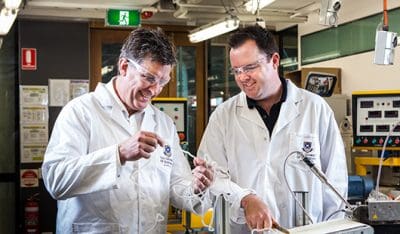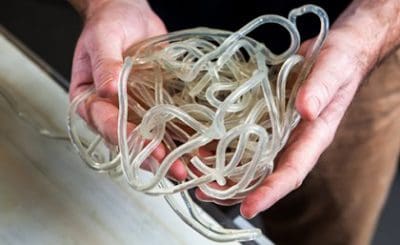RESEARCHERS from the University of Queensland (UQ) and the Manildra Group have teamed up to work on developing a fertiliser which will minimise run-off and nutrient loss from sugarcane farms.

Manildra Group technical manager Mark Baczynski and University of Queensland chemical engineering research fellow Paul Luckman inspect the wheat-starch blend being examined for its potential as a sugarcane fertiliser. Image: UQ/Manildra Group
UQ researcher Paul Luckman said plants absorbed only around 50 per cent of nutrients from fertilisers, and the other half was released into the air, or ran into catchments or leached into groundwater.
“There has been little innovation in the technology around fertilisers for the past 100 years.
“Most fertilisers used today are made to dissolve quickly and be immediately absorbed by crops, but if a crop is in its early stages, it can’t always use what’s available and the fertilisers can be lost from soil.”
“We are working to create a fully biodegradable material that slows down the release of nutrients at the rate of the plant taking it up, so we won’t have the problem of extra nutrients drifting around in the soil and ending up in our waterways and eventually running into the Great Barrier Reef.”
The UQ-Manildra collaboration will be running field trials over the next 18 months, and will focusing on Queensland sugarcane crops.
“We’re looking forward to working with farmers to demonstrate how we’ve increased fertiliser efficiency to ensure good crop yields without negative impact on the environment.”
Manildra Group is an Australian family-owned company which operates state-of-the-art flour mills, and starch and ethanol plants in Australia and North America.
Manildra Group technical manager Mark Baczynski said the project was looking to develop a win-win situation for farmers and the Great Barrier Reef.
“We have engaged with UQ because of its world-class expertise in many different facets that relate to this project, such as controlled-release matrices for fertilisers, biodegradable polymers, starch characterisation, and the mathematical modelling of these attributes,” Mr Baczynski said.

A blend of wheat starch is being examined under a University of Queensland and Manildra Group project which aims to develop a low run-off fertiliser for the sugarcane industry. Image: UQ/Manildra Group
“We’re hoping that the collaboration will result in the creation of a commercially viable next-generation fertiliser, specifically targeted for Australia’s sugar industry, to replace the current market fertilisers that are inefficient and costly.”
Source: UQ, Manildra Group

HAVE YOUR SAY